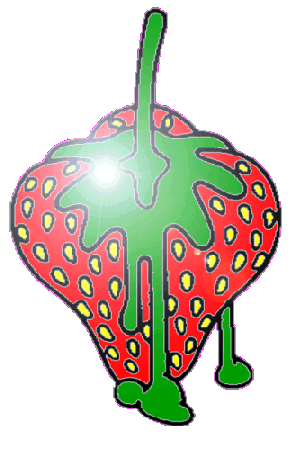
PART 2: ELECTRIC BAND
Part 1: Folk Club Days
Part 2: Electric Band
Part 3: After The Break
Part 4: Don't Say Goodbye
Part 5: End Of The Millenium
Part 6: Acoustic Odyssey
Part 7: Multiple Line-Ups
Part 8: 40 and Counting ...
Part 9: Hero arising and the big 50
Keyboard for hire
Rick was a student at the Royal Academy of Music, who after being introduced to sessions by Chas Cronk (later to join the Strawbs), took to them like a duck to water and played on countless sessions, mainly for Tony Visconti, who at that time was connected with Denny Cordell's Regal Zonophone label and artists such as David Bowie, Tyrannosaurus Rex, Joe Cocker. He swiftly acquired the nickname "One-Take" Wakeman, playing on such hits as Bowie's "Space Oddity" and Cat Stevens' "Morning Has Broken".
Via the Visconti connection, Wakeman had played on Dragonfly, and had written to thank Cousins for the album sleeve credit - the first he'd had after many, many sessions. Rick joined the Strawbs in April 1970 just before his wedding, and he and his wife combined their honeymoon with a week-long gig the Strawbs were committed to in Paris - a surreal experience accompanying various circus acts in the "Rock n Roll Circus". A visual record of this line-up - performing "Till The Sun Comes Shining Through" on a Granada folk programme - appears as a bonus feature on the Strawbs Tokyo '75 DVD released in 2003.

Rick Wakeman, keyboard wizard
Cooper left the band shortly after their return to England, and Cousins and Hooper took stock: Strawbs hadn't really taken off as well as they had hoped after the initial buzz of the A&M signing. They reasoned that, by adding a keyboard player, they had already effectively taken the group out of the folk circuit, so they decided to add further musicians to turn the group into a full scale five-piece band. Bass player John Ford and drummer/percussionist Richard Hudson recruited in May 1970 from the Velvet Opera, regular visitors to the Hounslow Arts Lab which had developed out of their White Bear folk club activities. Throwing caution to the winds, they also decided that this band would make a huge London debut at the Queen Elizabeth Hall in July 1970.
The new band did a few local gigs, and then travelled round the country on a package tour with Roy Harper, breaking in the new songs which would form the basis of their London concert, as well as newly arranged band versions of some of their best-known songs. They performed at various open air festivals - the Bath Festival, the Portsmouth Pop Day and the Buxton Festival, and the new line-up started to get excellent reviews in the music press.
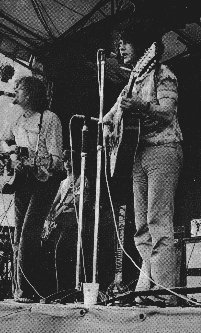
Early gigs with the new line-up
Wakemania
The QEH concert on 11 July 1970, which was recorded live for their third album, received rave reviews - the Melody Maker announced on its front page that Rick Wakeman was "Tomorrow's Superstar", with particular praise for his piano solo "Temperament of Mind" which had started out as a time-filler when the power went off at a gig in Sheffield, but which rapidly had become a regular feature of their concerts. An extended and violent organ solo on "Where Is This Dream Of Your Youth" also gave Wakeman room to display an extraordinary talent for improvisation. Extensive coverage followed in the music press, including the news that Keith Emerson, reigning keyboard wizard, then with ELP, had booked a box at a Strawbs gig at the Lyceum to hear this new contender for his crown.
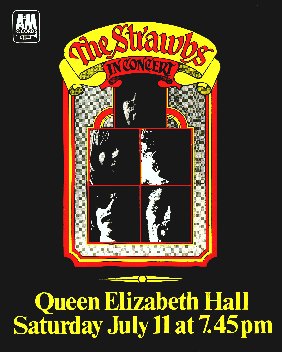
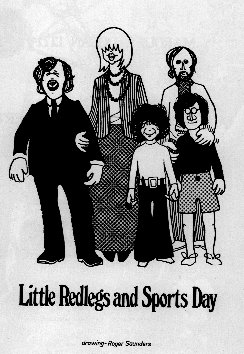
QEH gig programme cover and cartoon
The album Just A Collection Of Antiques And Curios, released later that year, showcased mainly the new tracks, and was the first Strawbs set to be released in the US. Initially the American label were uncertain about releasing a live album, but were persuaded by the record's chart performance in the UK. Reviews were excellent, and the album made number 27 in the UK album charts.
Witchwood
After a swift trip over to Europe for a whistle-stop tour of Dutch clubs, a series of UK dates was announced for early 1971, taking in major festivals in Lanchester and Wexford in Ireland. The band used the gigs to break in the new songs for the next album, notably the powerful Cousins epics "The Hangman and the Papist" and "Sheep". Around this time, Hud started to play a full drum kit again for the first time since joining the Strawbs principally as a percussionist.
During the course of February and March 1971, the band worked on the new album, to be called From The Witchwood, in George Martin's Air Studios; once again Visconti was the producer. The sessions started well, with "Hangman" being recorded live in the studio pretty much as it appears on the album: however conflicts developed. There were disagreements as to the choice of material to be included on the album, and differing ideas as to how things should be done. Whilst the other members of the band had tried to write material in the Strawbs' style, some of the results weren't always to Dave Cousins' liking. On top of that, Rick Wakeman's financial position was so bad that he was having to work on lots of external sessions for other musicians to keep his head above water and was frequently not around for the Strawbs sessions, so that the keyboard parts had to be overdubbed later.
The band appeared on BBC's Top of the Pops's short-lived album slot playing "The Hangman and the Papist". However, at the time Dave felt the effect of the song was spoilt by a shot of Wakeman grinning like a loon, holding up the paint roller that he kept by his keyboards for those sweeping runs from one end of the keyboard to the other: the performance has been immortalised in Wakeman's various biographies as "The Hangman and the Paint Roller"!
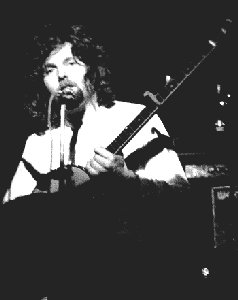
Dave with banjo
The last song on the album, the hymn-like "I'll Carry On Beside You" with Tony on lead vocals, and Dave on lead guitar, was initially intended as a single, but at a late stage "Witchwood" replaced it as the A-side. However, the tracks on the B-side (a John Ford composition "Let's Keep The Devil Outside" (which itself featured as a Japanese A-side) and a cut from the QEH concert "We'll Meet Again Sometime") were not recorded at full volume and the single was withdrawn shortly after its release with only a few promotional copies and release copies being distributed. It was also reported that there had been disagreements as to what should be released as a single were continuing, and the easiest way of settling them may have been not to have a single at all!
Don't be blue
The band toured the UK to promote the album in April/May 1971, appearing at medium sized club, university and concert hall venues around the country. The album reached number 39 and sold reasonably well, though reviews were less overwhelmingly positive than they had been for Antiques. Given his wide range of other activities, and apparently itchy feet, the music press had been predicting for months that Rick Wakeman would leave the band, and a couple of months after the album's release, it was announced that he would be leaving the Strawbs to join Yes as Tony Kaye's replacement.
Rick was with the band for little over 15 months, a period which had seen the Strawbs catapulted from the folk clubs to stardom, concert halls and electronic music. Whilst Antiques serves as a representation of that line-up's live performance, From The Witchwood is the only studio album featuring the band's most famous member, and is highly regarded by many "prog" music fans as the Strawbs' most progressive album, whatever that means.
Wakeman's replacement was Blue Weaver, a former member of the pop band Amen Corner, who, after a brief spell in Andy Fairweather Low's would-be progressive outfit Fairweather, joined Strawbs in August 1971. The band headed off down to Cousins' Devon retreat for rehearsals, and very shortly the new line-up were in the studio to record a single "Benedictus".
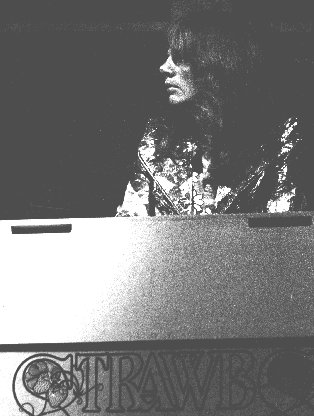
New recruit Blue Weaver
Concept album
Grave New World, the new album which followed, was recorded in Morgan Studios in the last few months of 1971 and was in many people's eyes the Strawbs' masterwork. Establishing a loosely defined conceptual framework - man's eternal journey through life from birth to death, the band found a place within it for various new tracks - including Cousins'' latest epic "New World", a second song dealing with the Irish troubles - as well as a few from the archives, which hadn't made earlier albums.
"New World" had been written after Cousins saw a TV programme about Ireland, with street corner kids wearing tin hats and toy rifles, playing at soldiers. In the same vein, John Ford contributed "Heavy Disguise" (formerly entitled "IRA Meeting Blues") and Hud contributed the spiritual "Is It Today Lord". "Tomorrow", its harsh and bitter lyrics allegedly written by Cousins after Rick Wakeman left the band (though any rift there was has now healed) featured an extended instrumental section, which took over from "Sheep" as the instrumental showcase for the band, featuring an extended drum solo round the kit and beyond by Hud, and some keyboard pyrotechnics by Blue.
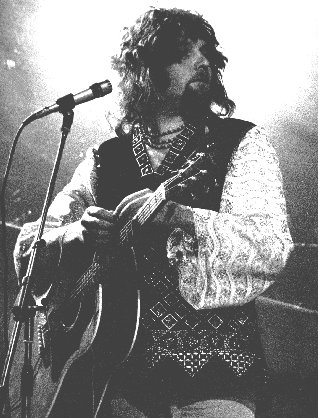
Dave on stage during early concert with Blue
Released in February 1972 to coincide with a major UK tour, the album Grave New World sold very well, and was the first Strawbs album to enter the US album charts.
Strawbs' electric love affair
On tour, there was some criticism from sections of the UK music press that Strawbs had abandoned their folk roots and substituted electric instrumentation and volume, to the detriment of the music. One of Blue's first gigs with the band, back in October 1971, had been a multimedia experiment at London's Shaw Theatre, with films, mimes and ballet dancers, and the band extended this for their London gig on the tour at the Royal Festival Hall. This led to the making of a 30-minute film "Grave New World", released in April 1972, and re-released at last in 2003 as a supporting feature on Strawbs '75 in Tokyo DVD. In the middle of the tour the band slipped away to record an out and out pop single - "Here It Comes".
Next, Dave took some time out from the Strawbs to record his long-awaited solo album Two Weeks Last Summer, with top rock sessionmen Roger Glover (Deep Purple), Jon Hiseman (Colosseum, Tempest) and ex-Strawb Rick Wakeman. The album had a more rock-based feel than Strawbs albums to date, reflecting Dave's growing interest in out and out rock music.
Another prominent guest was guitarist/vocalist Dave Lambert, who had met Cousins a few years before whilst still fronting his own band Fire. After having undertaken a few duo acoustic gigs with Dave in 1971, Lambert was now a leading light of the King-Earl Boogie Band (which rose from the wreckage of pop band Mungo Jerry, with Lambert effectively replacing Ray Dorset). Cousins had produced and played banjo on one track of the Boogie Band's album, which like Two Weeks, was recorded at Richard Branson's brand new Manor Studios in Kidlington, just outside of Oxford.
After a trip to Europe for various festivals, and an appearance at the Great Western Festival in the UK, the band headed over the Atlantic for their first US tour, opening in Los Angeles at the Whisky-A-Go-Go. On their return to the UK, they played a few UK gigs, on some of which Dave Lambert guested for an encore "Going Home", the single from Dave's solo album. During the US tour, Tony Hooper's concerns about the band's direction away from folk towards rock music had increased: at the last of these gigs, the Chelmsford Folk Festival, Lambert's rock'n'roll guest spot brought things to a head and Hooper left the band. Shortly afterwards it was announced that Lambert would join the band as Tony's replacement.
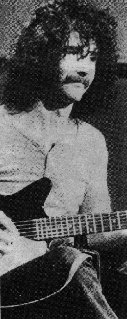
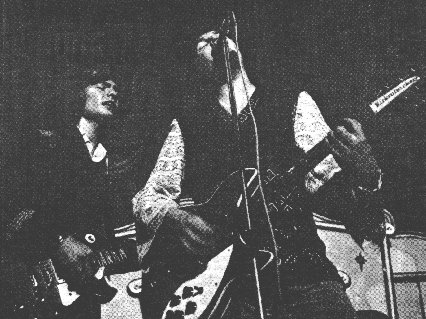
Exit Tony Hooper (left) as Dave Lambert debuts with the Strawbs (right)
Chart success
Two Weeks Last Summer wasn't released until October 1972, when it co-incided with the release of a single from the new Strawbs line-up, "Lay Down", based loosely on the 23rd Psalm, which was at last to take the band into the UK singles charts, peaking at number 12. Unfortunately the success of the single wholly eclipsed Dave's solo album, which had limited promotion and sold poorly as a result. "Lay Down" drew further criticism from some quarters to the effect that Cousins and co. had "sold out", to the extent of appearing complete with glitter and flash clothes on BBC's Top Of The Pops.
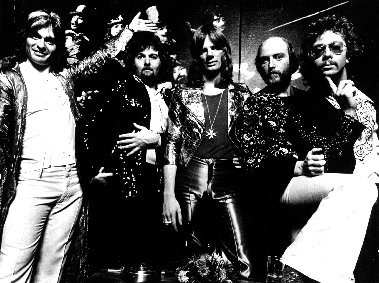
Glitterati - A&M promo shot
Studio time was also booked for a new album, which was in the event to take nearly three months as internal difficulties and differences of opinion, which had not recurred during the sessions for Grave New World, came back with a vengeance. The Hudson Ford writing team were finding it difficult to secure a place for their songs on the album, despite a shortage of material.
Ironically, one song of theirs "Part Of The Union", which they had felt was a sure fire hit, though inappropriate for the band, and which they planned to release as a single under the name "The Brothers", did find a place on the album. Indeed it was chosen as the band's next single, despite the misgivings of some who would have preferred to release another, more Strawbs-like track as the second single. "Part Of The Union" was released in January 1973, and reached the number 2 slot in the UK singles chart, held off the summit by Sweet's "Blockbuster" and Slade's "Cum On Feel The Noize".
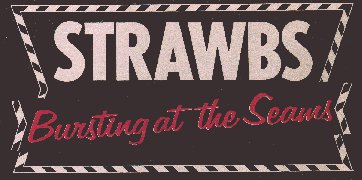
Promo sticker for the album
As well as the two hit singles (an alternative, album, version of "Lay Down" was included) the album, Bursting At The Seams contains seminal Strawbs tracks which remain in the live set to this day: "The River"/"Down By The Sea" - the latter two songs an epic tour de force which frequently serve as the finale to the main set. Dave Lambert contributed a gentle love song "The Winter And The Summer" and the Hudson Ford team had "Lady Fuschia" and "Tears and Pavan" co-written in part with Dave Cousins. The album also performed well in the charts, also reaching number 2 in the UK.
Bursting (literally) at the seams
The band embarked upon a gruelling 52-date tour in the UK, which reached a climax at the Rainbow Theatre in April. The setlist had reflected the large venues, and though it contained some comedy set-pieces - Hud's falsetto version of the Little Jimmy Osmond hit "Long Haired Lover From Liverpool" and an airing of his skinhead song "Bovver Blues" and his version of the "William Tell Overture" played on cheeks by Dave Lambert, it lacked the warm rapport with the audience which had always been a keynote of Strawbs gigs in the past. Relationships within the band were at breaking point, as evidenced by Dave's pointed solo spot at the Rainbow, "A Song For Me", which later saw the light of day on Dave and Brian Willoughby's Old School Songs.
As before, the stresses and strains of an exhausting US tour, set to follow the marathon UK tour, were to act as a catalyst, this time breaking the band in two. A painful split camp situation developed, to the extent that various members were not speaking to each other. Initially, according to reports, the other four members of the band wanted to jettison Cousins and carry on Strawbs without him. As things developed however, Lambert, having tried throughout to act as peacemaker between the camps, eventually threw in his lot with Cousins, and they kept the Strawbs name, whilst Hud and John struck out on their own. Blue Weaver was left marooned, a member of neither camp, and exited to return to session work and later joining a couple of other high powered bands - Blue has actually probably had more chart success than any other Strawbs member - Amen Corner, Fairweather, Strawbs during their chart heyday, Mott the Hoople and the Bee Gees band.
Looking back at the split, all are now agreed that it was both unfortunate and avoidable - sadly, for the Strawbs it proved to be an abrupt end to their newly-found chart success in the UK.

